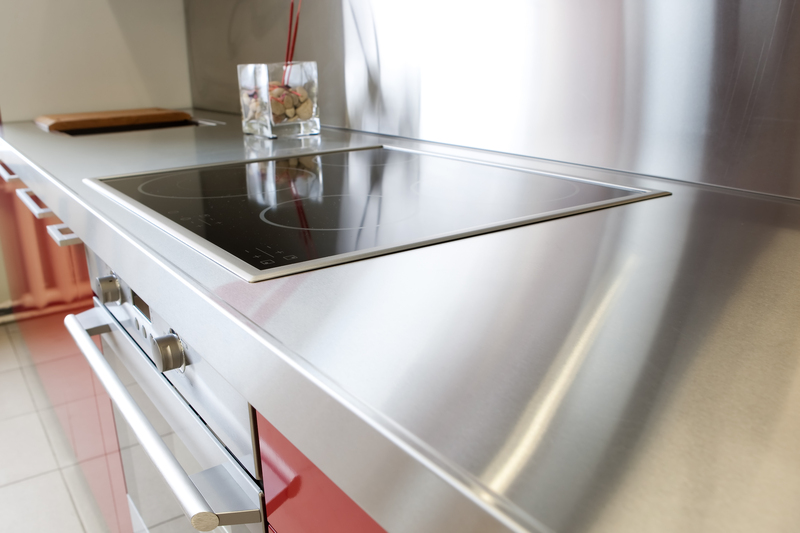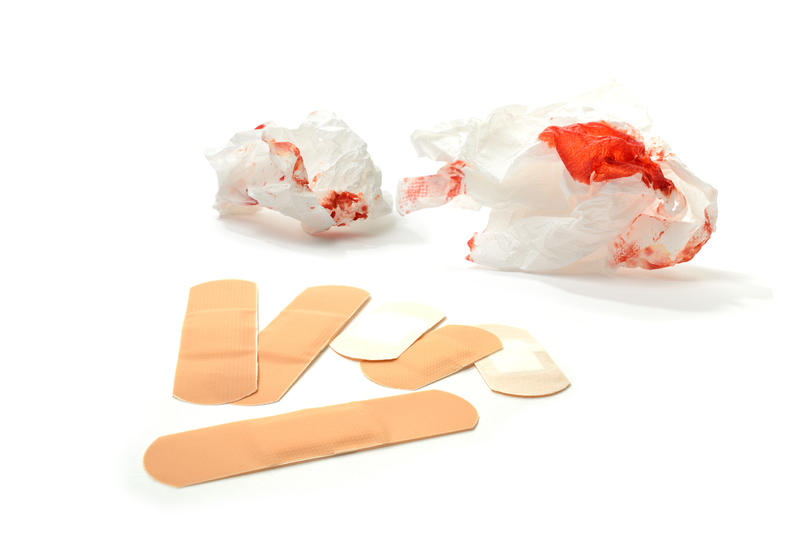Gleam Guide: Secret Jewellery Cleaning Tips
Posted on 28/06/2025
Gleam Guide: Secret Jewellery Cleaning Tips
Jewellery isn't just an accessory--it's a cherished memory, a symbol of celebration, and a treasured heirloom. Over time, however, jewellery can lose its sparkle due to daily wear, dust, natural oils, and environmental factors. If you're wondering how to restore your beloved pieces to their former glory, you're in the right place. Welcome to the Gleam Guide: Secret Jewellery Cleaning Tips--your ultimate resource for keeping your jewelry dazzling!
Table of Contents
- Why Jewellery Cleaning Matters
- Understanding Different Jewellery Materials
- Essential Dos & Don'ts of Jewellery Cleaning
- DIY Secret Jewellery Cleaning Techniques
- Special Tips for Stones and Unique Pieces
- Prolonging Your Jewellery's Sparkle: Maintenance Tips
- When to Seek Professional Help
- Frequently Asked Questions

Why is Cleaning Jewellery Important?
It may seem harmless to let your favorite necklace go uncleaned or to wear your wedding ring constantly, but neglecting regular jewellery cleaning can lead to wear, tarnish, and even long-term damage. Regular cleaning not only enhances brilliance but also preserves the longevity of your cherished ornaments. Here are some key benefits:
- Restores Shine: Removes grime and restores the piece's original luster.
- Prevents Damage: Eradicates substances that can degrade precious materials.
- Enhances Beauty: Clean jewellery complements your appearance and makes you stand out.
- Preserves Value: Well-maintained pieces maintain market and sentimental value.
Understanding Different Jewellery Materials
Each type of jewellery material--from gold and silver to platinum and gemstones--requires distinct care. Knowing your jewellery's materials is essential before starting any cleaning routine.
Common Jewellery Materials
- Gold: Soft, but doesn't tarnish easily. Prone to scratches.
- Silver: Softer than gold, tarnishes quickly but cleans up well.
- Platinum: Durable, less likely to tarnish but can get dull.
- Gemstones: Sensitive; some react poorly to heat, water, or chemicals.
- Costume Jewellery: Made from mixed or plated metals, more delicate and prone to peeling or discoloration.
Secret Jewellery Cleaning Tip: Always identify materials before starting the cleaning process; using the wrong method may cause irreversible damage!
Essential Dos and Don'ts of Jewellery Cleaning
Incorrect jewellery cleaning methods can cause more harm than good. Follow these crucial dos and don'ts to keep your pieces pristine:
Dos
- Use gentle, lint-free cloths for wiping jewellery.
- Test cleaning solutions on small, hidden areas first.
- Rinse thoroughly after cleaning to remove any residue.
- Dry with a soft, clean towel.
- Store jewellery separately to avoid scratching.
Don'ts
- Avoid harsh chemicals like bleach or acetone.
- Don't use abrasive materials (e.g., toothbrushes) on delicate stones.
- Never soak antique or costume jewellery for long periods.
- Don't expose gems to excessive heat or direct sunlight.
- Avoid ultrasonic cleaners for fragile or glued pieces.
DIY Secret Jewellery Cleaning Techniques
Want to restore your jewellery's gleam at home? Discover these expert-approved secret jewellery cleaning tips using ingredients you already have!
1. Gentle Soap and Warm Water Method
- Mix a few drops of mild dish soap with warm water.
- Soak jewellery for 5-15 minutes.
- Gently rub with your fingers or a very soft brush (baby toothbrush for resilience).
- Rinse and dry thoroughly.
Ideal for: Gold, platinum, diamonds, and most gemstones.
2. Baking Soda Paste for Stubborn Tarnish
- Make a paste with baking soda and water.
- Apply gently with a cloth.
- Rinse with lukewarm water and polish with a soft cloth.
Perfect for sterling silver--but avoid on pearls or porous stones!
3. Alka-Seltzer Soak
- Dissolve two Alka-Seltzer tablets in a glass of water.
- Soak non-porous jewellery pieces for 2-3 minutes.
- Remove, rinse, and polish gently.
Secret revealed: The fizz helps loosen soil and debris!
4. Ammonia Solution (Use With Caution)
- Mix 6 parts water to 1 part ammonia.
- Briefly soak diamond jewellery (never pearls or porous stones) for no more than a minute.
- Rinse instantly and dry.
Warning: Never use ammonia on antique, colored, or costume jewellery!
5. Toothpaste Trick
- Use a non-gel, white toothpaste.
- Apply a tiny amount on a soft cloth and gently polish metal surfaces.
- Wipe clean with a damp cloth.
Works wonders on silver, but avoid contact with stones or enamel.
Special Tips for Gemstones and Unique Jewellery
Cleaning gemstone or vintage jewellery often requires special attention. Here are our expert jewellery care secrets for the trickiest pieces:
Cleaning Pearls
- Wipe after each use with a damp, soft cloth to remove body oils and perfume residue.
- Every few wears, use a mild soap solution (never soak pearls).
- Let them air dry flat to prevent the string from stretching.
Opals, Amber, Turquoise, and Other Porous Stones
- Never soak. Wipe gently with a damp cloth.
- Avoid soap, chemicals, or ultrasonic cleaners.
- Store away from sunlight and heat.
Vintage and Costume Jewellery
- Use a dry soft brush to remove dust.
- Moisten a Q-tip with water to spot clean.
- Pat dry; avoid immersing in liquid as glue settings may dissolve.
Prolonging Your Jewellery's Sparkle: Maintenance Secrets
- Last on, First Off: Put your jewellery on last while getting dressed and take it off first when undressing.
- Avoid Moisture: Remove rings and bracelets before washing hands, swimming, or showering.
- Sensible Storage: Store jewellery in soft-lined compartments or pouches, away from direct sunlight and moisture.
- Rotate Regularly: Don't wear the same pieces every day to reduce wear.
- Inspect Regularly: Check for loose stones or parts to prevent loss or damage.
Insider tip: Keep silica gel packets in your jewellery box to absorb excess humidity and prevent tarnish!
When to Visit a Professional Jeweller
Sometimes, even the most thorough home jewellery cleaning tips aren't enough. Notice any of these signs? It's time to seek expert help:
- Severe tarnish or stubborn grime that won't lift
- Loose, missing, or damaged gemstones
- Broken clasps, chains, or settings
- Antique or high-value items needing special care
Professional jewellers use advanced, safe techniques--like ultrasonic baths and steam cleaning--that can restore, polish, and protect your most valuable pieces.

Frequently Asked Questions About Secret Jewellery Cleaning
How often should I clean my jewellery?
Regular cleaning is recommended every two weeks for frequently worn pieces; deeper cleaning or professional services should be done two to four times a year.
Is homemade jewellery cleaning safe?
Absolutely! Just ensure you use the correct method for your jewellery's material. Always conduct a patch test and avoid harsh, abrasive techniques on delicate items. When in doubt, consult a jeweller.
Can I use vinegar or lemon juice to clean jewellery?
While vinegar or lemon can clean certain metals, they can damage soft stones like pearls, opals, or emeralds. Proceed with caution and avoid on porous stones.
Will frequent cleaning damage my jewellery?
Not if you use gentle methods. Over-cleaning or using harsh chemicals can cause wear; stick to recommended techniques for lasting sparkle.
What about ultrasonic cleaners?
Ultrasonic cleaners work well for plain gold, silver, and diamonds, but can damage softer stones, pearls, or glued settings.
Final Thoughts: Keep the Gleam with These Secret Jewellery Cleaning Tips!
Keeping your jewellery shining doesn't have to be a mystery. With the right jewellery cleaning secrets, your prized items can gleam for generations. Remember to match the cleaning method to the material, avoid harsh chemicals, and follow a consistent care routine.
Do you have a secret jewellery cleaning tip? Share your experience below or pass this Gleam Guide to a friend who loves to see their jewellery sparkle!
Ready to bring back the brilliance? Start with these tips today--your jewellery (and future self) will thank you!




